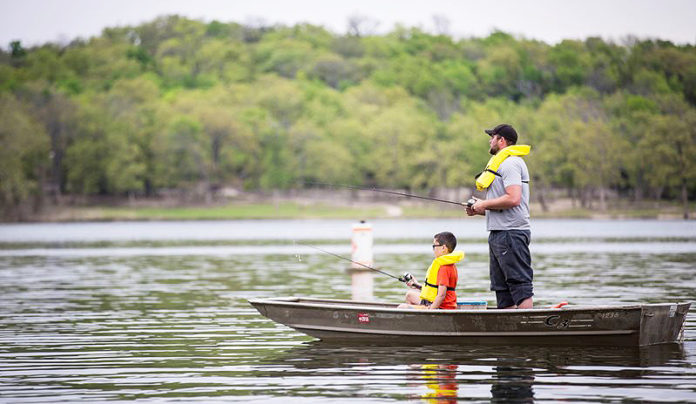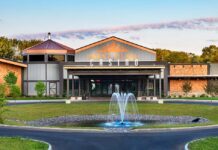
SULPHER, OK – Chickasaw Nation Governor Bill Anoatubby was honored with the prestigious Pegasus Award during the Sulphur Area Water Sustainability Reception, held at the Artesian Hotel in Sulphur, Oklahoma on July 26. This recognition was bestowed upon him on behalf of the Chickasaw Nation for their commitment to community water sustainability. The event, hosted by the Arbuckle Master Conservancy District, OKA (Water) Institute of Ada, and Buckhorn Rural Water District, brought together key figures and stakeholders in the realm of water conservation and management.
Kris Patton, the Director of Natural Resources at the Chickasaw Nation, explained the significance of the Water Pegasus Award. The accolade was granted to Governor Anoatubby as a symbol of the Chickasaw people’s dedication to preserving water resources in Sulphur and beyond. It celebrated their outstanding leadership, devotion to water sustainability, and their ability to foster unity within their community.
The ceremony also recognized other individuals for their contributions to sustainable water management. Rep. Charles McCall, the Oklahoma Speaker of the House, and Ken McQueen, Secretary of Energy and Environment for the State of Oklahoma, were honored with Pegasus Awards for their noteworthy efforts in the field.
At the heart of the Chickasaw Nation’s initiatives lies a profound commitment to constructing a sustainable water future. This vision is actualized through the Office of Natural Resources, an endeavor envisioned by Governor Anoatubby to oversee the implementation of water settlements with the State of Oklahoma and safeguard the tribe’s natural resources. As climate experts anticipate 2023 to be the warmest year on record, the Chickasaw Nation’s collaborations with smaller municipalities within their borders have gained heightened significance.
The Chickasaw Nation, in partnership with the State of Oklahoma and the Oklahoma Water Resource Board, has dedicated tens of millions of dollars to water projects across Murray County and other areas within the Chickasaw Nation. These initiatives are funded by federal proceeds received through the American Rescue Plan (ARPA), which aims to mitigate economic impacts of the pandemic. ARPA funds are utilized to enhance water infrastructure within communities, exemplifying a shared commitment to the well-being of citizens.
Collaborative efforts are channeled into projects that directly impact key districts, such as the city of Sulphur, the Buckhorn Rural Water District, and the Arbuckle Master Conservancy District (AMCD). Developed with the Chickasaw Nation’s steadfast support over several years, these projects are designed to alleviate pressure on the Arbuckle Simpson Aquifer. This principal water source is pivotal for thousands of residents in south-central Oklahoma and serves as the foundation for economic activities in the area.
Through these strategic endeavors, countless gallons of water will be conserved, preventing undue stress on the aquifer. The Office of Natural Resources has expanded its purview to extend assistance to communities in need of planning resources. This proactive approach has led to the Chickasaw Nation’s involvement in multiple ARPA projects, epitomizing their dedication to sustainable water management.
One pivotal collaboration funded by the Chickasaw Nation involves the AMCD and Sulphur. This venture aims to transport water from the Lake of the Arbuckles to Sulphur, highlighting the power of cooperative efforts in achieving shared goals. The AMCD has committed to constructing a pipeline from the lake to a high-capacity holding tank on Sulphur’s property, with the city overseeing the pump station and an additional pipeline to distribute the water.
While this water is “raw” and not meant for consumption, it finds utility in industrial and irrigation applications. Local entities such as schools, cultural centers, and sports fields are encouraged to access this resource. The establishment of this irrigation waterline promises substantial savings for Sulphur, as treatment costs are eliminated. Potable water can then be allocated for consumption.
The project is especially transformative for Sulphur, which had been allocated water from the Lake of the Arbuckles for decades but lacked the infrastructure to access it. With this new waterline, the city can now utilize its allotted water share to meet irrigation demands, representing a significant step toward sustainable water management.
The impact of these initiatives extends to safeguarding vital natural resources. The Chickasaw National Recreation Area, reliant on the Arbuckle Simpson Aquifer, faces potential water scarcity during extreme droughts. To secure its water supply, Sulphur is set to drill three new water wells outside the Aquifer’s setback zone, ensuring the continued availability of drinking water and preserving the area’s ecological and economic vitality.
In addition to Governor Anoatubby, the reception featured speakers including Dan Boren, Chickasaw Nation Secretary of Commerce; Kris Patton, Director of the Natural Resource Office; and various other experts and officials.
Beyond Sulphur, the Chickasaw Nation’s commitment extends to various projects across the region, collaborating with towns like Tishomingo, Mill Creek, Stonewall, and Lone Grove. For instance, Tishomingo, with a sole water source vulnerable to drought, is tapping into the Arbuckle Simpson Aquifer to ensure water security. Collaborative efforts with the Chickasaw Nation and the state aim to establish a new wastewater treatment plant and further strengthen water infrastructure.
Through these collective endeavors, the Chickasaw Nation exemplifies its dedication to sustainable water management, community well-being, and environmental preservation.














































